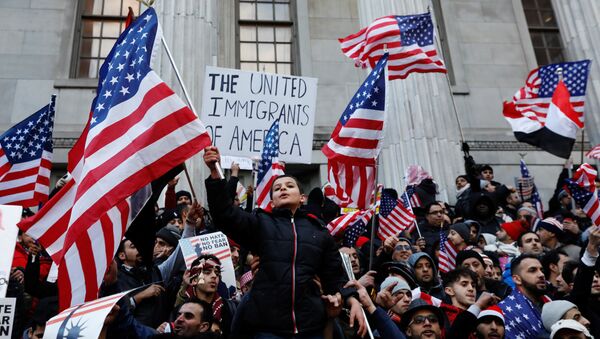Trump's third attempt to ban travelers from certain countries, regardless of their visas status, has been approved by the US Supreme Court. The court has nullified two injunctions imposed by lower courts that had previously blocked the ban. Trump first sought to implement the executive order after his inauguration in January. The most recent iteration bars nationals of eight countries from entering the United States. The targets include Iran, Libya, Somalia, Syria, Yemen and Chad as well as North Korea and Venezuela. President Trump insisted that the measure was needed to protect the United States from terrorism. However, critics claim that it violates the US Constitution.
Sputnik discussed the issue with Seth Frantzman, a commentator on Middle East politics.
Q: Trump says the ban does not discriminate against Muslims, while the human rights advocates claim the opposite, and there is a kind of middle view that the ban only affects poor Muslims, since Saudi Arabia is not included, and when we talk about terrorism, we can say that there has been a higher record of terrorism coming from Saudi Arabia, for instance, 9/11. What is the gist of this ban?
Q: Why has that now become interesting? Is it because Trump has made statements that people have taken as racist or anti-Muslim?
A: Trump did say many offensive things against Mexicans and the Muslims, so there was an initial reaction when whatever he does is seen as racist. The irony of all this is that under Obama more undocumented aliens were being deported than during any other administration before that. Under Obama there were harsh restrictions, very difficult restrictions for people coming from the Muslim world. The difference is that Obama paid lip service to doing good things, which is, of course, not being racist, cocking pleasantly about Mexico and Latin America and giving a speech in Cairo. The kind of typical irony we see is that if you just pay lip service to doing good while having policies that are not that great, it's sometimes preferable than being seen as someone like Trump, who seems to be portrayed as right-wing racist (and he acts like one sometimes), whereas the policies themselves have not changed much.
Q: Is this ban going to affect relations with these countries? Is it going to affect the American image on the international scene?
A: Most of the countries that he selected are countries that barely exist. Yemen barely has a government, in Libya the recognized government does not function very well. Some of the countries are just seen as failed states or as pariahs like Syria. North Korea is also a pariah, Venezuela, Iran of course… I don't think [the ban] matters that much, because most states have a kind of consensus that these states have serious, serious troubles.
Q: How do you think it is going to affect families? Families in America who have relatives in those countries. Is this going to help fight terrorism? What is going to be the result of this ban if it goes into full force?
A: I don't know if it helps [fighting] terrorism, but I think it definitely hurt people that are already victims, in a sense that there are like 5 or 10 million people displaced by the Syrian conflict. These people live in refugee camps for many years. And if they aren't going to get to go home or have family in the States, why not make it possible for some of them to come? And under Obama administration they were making it slightly easier. While it's also difficult for people from many other states to come to US, it seems unfortunate to punish countries that are already [essentially] failed states, where the people are fleeing terror, and make it more difficult for them rather than easier.




